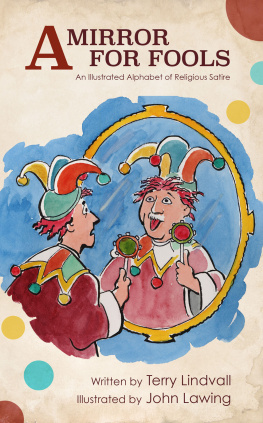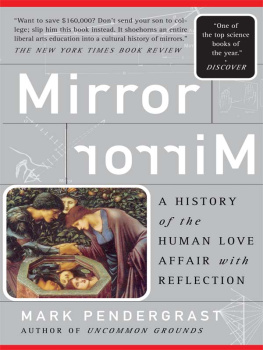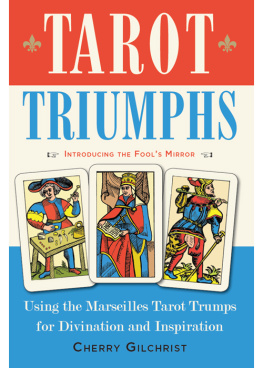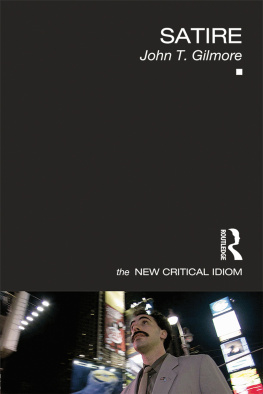A Mirror for Fools:
An Illustrated Alphabet of Religious Satire
written by Terry Lindvall
illustrated by John Lawing
Copyright 2015 Terry Lindvall
ISBN 978-1-633930-24-7
All rights reserved. No part of this publication may be reproduced, stored in a retrieval system, or transmitted in any form or by any means electronic, mechanical, photocopy, recording, or any other except for brief quotations in printed reviews, without the prior written permission of the author.
This is a work of fiction. The characters are both actual and fictitious. With the exception of verified historical events and persons, all incidents, descriptions, dialogue and opinions expressed are the products of the authors imagination and are not to be construed as real.
Published by

210 60th Street
Virginia Beach, VA 23451
212-574-7939
www.koehlerbooks.com

A free eBook edition is available
with the purchase of this print book.
_______________________________________
CLEARLY PRINT YOUR NAME ABOVE IN UPPER CASE
Instructions to claim your free eBook edition:
1. Download the BitLit app for Android or iOS
2. Write your name in UPPER CASE on the line
3. Use the BitLit app to submit a photo
4. Download your eBook to any device
AN ALPHABET PRIMER
OF SATIRE AND RELIGION
In honor of
Democritus, the cheerful laughing philosopher
and Jeremiah, the weeping suffering prophet
Mock on, Mock on, Voltaire, Rousseau:
Mock on, Mock on: tis all in vain!
You throw the sand against the wind,
And the wind blows it back again.
William Blake
T oo frequently religious arguments entail the passion and anger of its participants. What is missing is the wit and laughter of satire, in squeezing out ideas with an element of play. We forget the loose and sometimes acidic tongue and pens of religious characters that reveal their character as much as their serious theological or literary works. We hope to remedy that negligence. We also hope to live a few more years with our good-looking wives.
Our purpose is threefold: first, to visually introduce an historical character who contributed to the practice of humor and satire in cartoon form. Second, we offer a bit of doggerel to tease some aspect of the person. Third, we settle down and provide a bit of context for the illustration and the verse. Like Horaces dulce et utile, we hope to teach and delight simultaneously.
This mix of verse and illustration and commentary is meant to send readers back to the sources, to the rich, varied tradition of wit and humor being used for moral and spiritual reform. It then serves as that mirror that shows the reader his or her face, even as the authors recognize the marks of folly in their own.
John Lawing and Terry Lindvall
Ex-Regents
Dedicated to all those who laugh and
pray, especially those who have given
us reason to laugh and pray.

A is for Aristophanes, mischievous Greek
Who called thunder farting from Zeus cheek
And stuck Socrates up in a cloud
While mocking sophists for talking proud.
The Greeks boasted of many things, of democracy, philosophy, drama, rhetoric, and Dionysian orgies. However, their greatest glory may rest in the mischief of their comic playwright, Aristophanes. In the early 5th century BC, his political plays such as The Frogs and Lysistrata took pot shots at the populace of Athens during the Festival of Dionysius. In his peace play of Lysistrata, Aristophanes women refused to have relations with their husbands if they went off to war. Men realized how much they wanted peace.
In The Clouds, Aristophanes caricatured the great but ugly philosopher Socrates, whose own ironic wit was well known. He placed Socrates as the head of the Thinkery, where new (and inferior) ideas are introduced, such as the origin of the buzz of a gnat (its rear is shaped like a trumpet). Socrates went on to explain to a dense older student, Strepsiades, that in the oldest language on earth, Phrygian, that they actually call thunder phartos. If the little tummy of Strepsiades can produce a terrible rumbling sound, just think what the chief Greek god can do.
Perhaps what is most commendable about The Clouds is the poets dismantling of the modern education of the Sophists. As Socrates was accused (unfairly) of making the worse appear the better through his skilled discourse and clever dialectic, so the roguish Strepsiades own son twisted logic so that he could defend the beating of his father. So, too, we raised our sons to take away all our money.

B is for Boccaccio, who during the plague
Acquired leisure to frolic and drink from a keg.
His monks found nirvana in dark holy places,
Not only in cells, but neath naughty nuns laces.
The 1348 Black Plague devastated Europe due to an infestation of fleas carried by rats. A Florentine named Giovanni Boccaccio (1313-1375) graphically described the lumps on the groin and under the armpits. His fame, however, came from a collection of stories he wrote entitled The Decameron (ten days). Taking ten effervescent companions (seven women and three men), Boccaccio escaped the ravages of the city and found a haven in the countryside where the party told stories every night, enjoying wine and food.
Boccaccios tales range from the bawdy to the tragic, illustrating the providential goodness of Gods natural gifts (including sex) as well as the justice of His wrath upon sinners in the form of the bubonic disease. His portrait of the human comedy exposed the greed, lust, and hypocrisy of clerics as well as delighting in the folly that falls on all sinners, especially friars susceptible to carnality. One priest even taught a novice nun how to send his enflamed red devil down into hell through a special portal she possessed. But then she enjoyed sending the devil to hell so much that she wore him out. The elder ladies of the village advised her to find a virile buck of a husband and leave the clergy alone.
Mocking for Boccaccio held a moral purpose, but then the Black Death held an apocalyptic meaning for everyone. A blindfolded Lady Fortune spins her Wheel of Fortune, in which one rises and falls, depending upon the caprice of the Lady. Following the vicissitudes of life, Boccaccio ends up with witty religious instructions for those who have ears to hear.

C is for Chesterton, as large as the moon
Could see paradox hid in the bright sun of noon
As Gods holy jester, he was more than a clown,
A man who was Thursday and round Father Brown.



















